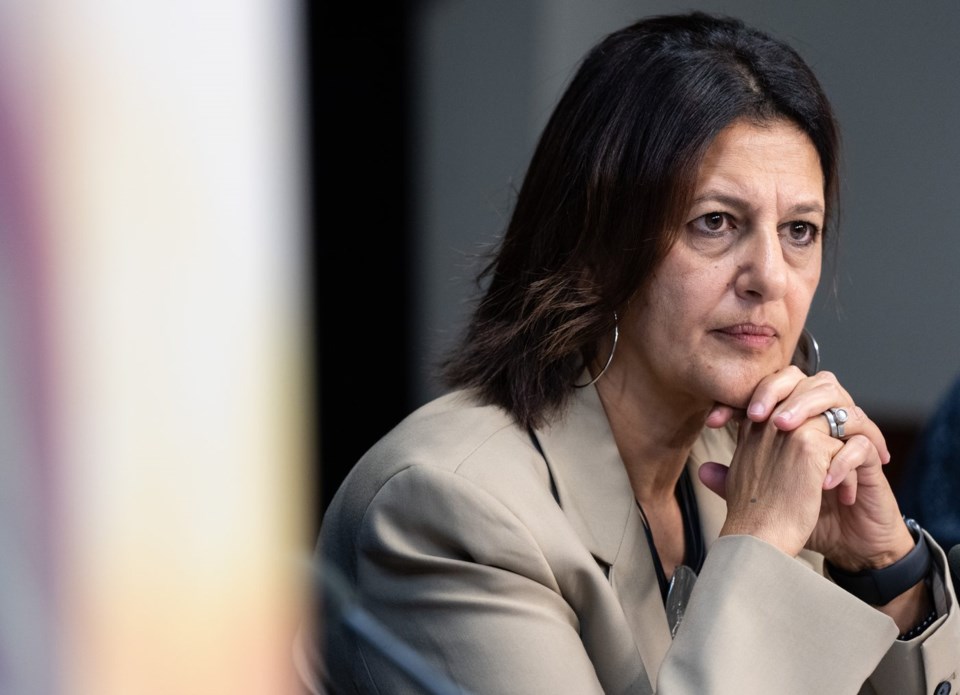MONTREAL — The family of a Quebec provincial police sergeant who was stabbed to death by a mentally ill man who wasn't taking his medication says it welcomes the coroner's report into her brutal murder.
But coroner GĂ©hane Kamel says that health-care workers must do a better job of communicating with each other about potentially dangerous mental health patients if tragedies like the one that took the life of Sgt. Maureen Breau are to be avoided.
"I invite all partners to talk to each other," Kamel told a news conference Tuesday, a day after she released her report that included 38 recommendations.
"We still have the right to talk to each other in Quebec and I understand that there is sacrosanct confidentiality, but we will have to find mechanisms quickly to be able to talk to each other."
Kamel said there were plenty of missed opportunities to help Isaac Brouillard Lessard, the 35-year-old man who stabbed Breau to death with a kitchen knife on March 27, 2023, before he was shot dead by police in his apartment building in Louisville, Que., about 100 kilometres northeast of Montreal.
Brouillard Lessard had been found not criminally responsible because of mental illness five times for offences in 2014 and 2018, and had been followed by the province's mental health board.
Breau's relatives watched Tuesday's news conference remotely and a family spokesman said they're ready to turn the page.
Dominic Roberge, a provincial police officer and longtime friend of Breau and her husband, said the family's major concern is that Kamel's 38 recommendations will be shelved rather than dutifully considered by authorities.
Many of her recommendations involve the need for better oversight of mental health patients. Kamel also says the province should reduce the number of hospitals that care for forensic psychiatric patients so that expertise isn't spread too thin.
Psychiatrists should be briefed on legal options available to them for patients being followed by the mental health board, she recommended. As well, Kamel said police should be better trained to deal with patients who have severe mental illness. And she said there should be some type of mechanism that alerts police when a patient who is followed by the mental health board moves to the territory they cover.
Kamel, who released her report into the deaths on Monday, said they could have been avoided had health-care workers communicated more closely with police and other colleagues in the health network. Her recommendations, she said, will mean little if health-care workers and police don't consult and collaborate and stop with a "it's not my backyard" mentality.
The coroner said authorities had the necessary leverage to have Brouillard Lessard hospitalized, but didn't know the full extent of his mental health deterioration because of a lack of communication.
“We had several missed opportunities to provide care to this young man,” Kamel said.
Roberge told reporters after Kamel's news conference at provincial police headquarters in Montreal that the Breau family is pleased with the work of the coroner and felt she listened to their concerns throughout the inquest.
"For them, it's the turning of the page," Roberge said, adding the closing of this chapter comes with a range of emotions for the family.
Breau, 42, a mother of two and veteran police officer with 20 years of service was days away from beginning a new job as an investigator.
The deaths led to the provincial government tabling a law in May that includes a budget of $11.3 million over five years for a team of "liaison officers" mandated to monitor people who commit crimes but who are judged to be not criminally responsible because of mental health disorders, and to assess the risk they pose.
Kamel said the law, which came before she released her report, shows the government was listening to the testimony during the inquest, and called it a good first step. But she noted more needs to be done as one out of two calls to 911 are related social issues — including a growing number related to mental health.
Meanwhile, the Quebec provincial police said Tuesday they are working to ramp up training for officers responding to mental health calls and adjusting to a different reality for front-line officers. "For example, 25 years ago, when I was at the police academy, we were still talking about bank robberies," said Chief Insp. Patrice Cardinal.
"It is essential that police officers participate in the solution … We can't have all the responsibility, but we can't be excluded from the responsibility either."
This report by The Canadian Press was first published Sept. 10, 2024.
Sidhartha Banerjee, The Canadian Press




